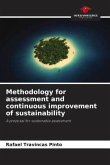Corporate sustainability refers to business
strategies that create long-term shareholder value
while embracing opportunities and managing risks in
order to add social and environmental values to
external stakeholders as well. Although theoretical
possibilities and generic business cases indicate
that strategies improving environmental and social
performance can increase shareholders value as
well, the absence of sustainability accounting
methods hinders most companies commitment to
sustainability. To address this need, this research
develops a methodology of performance evaluation to
account the values and costs of corporate
sustainability strategies in the framework of
the Triple Bottom Line . This methodology can help
generate ideas combined with an evaluation of the
stakeholder value impacts with which to compare
alternatives, refine initiatives, and establish
performance targets. It sheds valuable light on
the accountability of external values and costs that
are not captured by traditional financial methods.
strategies that create long-term shareholder value
while embracing opportunities and managing risks in
order to add social and environmental values to
external stakeholders as well. Although theoretical
possibilities and generic business cases indicate
that strategies improving environmental and social
performance can increase shareholders value as
well, the absence of sustainability accounting
methods hinders most companies commitment to
sustainability. To address this need, this research
develops a methodology of performance evaluation to
account the values and costs of corporate
sustainability strategies in the framework of
the Triple Bottom Line . This methodology can help
generate ideas combined with an evaluation of the
stakeholder value impacts with which to compare
alternatives, refine initiatives, and establish
performance targets. It sheds valuable light on
the accountability of external values and costs that
are not captured by traditional financial methods.








